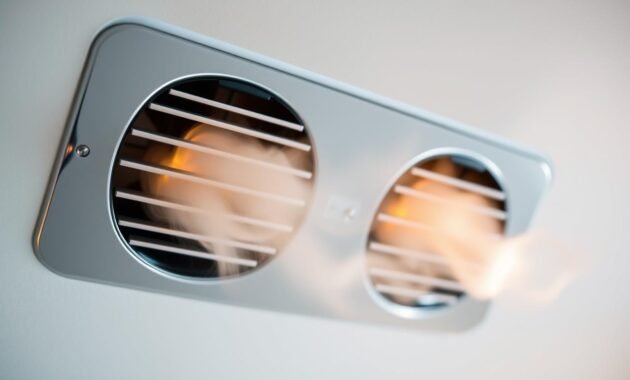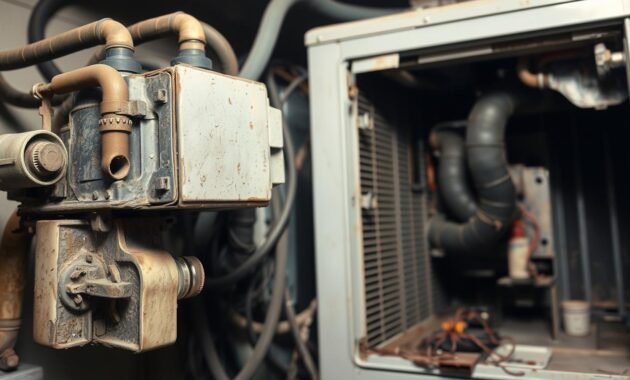Is your central AC not cooling like it should? Low freon might be the culprit. Many people don’t notice the signs until their AC starts to fail. Your AC needs refrigerant to cool your home, and without enough, it can’t do its job.
Ignoring these signs can lead to costly repairs and a hot home. Knowing the symptoms can help you avoid these problems. Let’s explore the key signs that your AC might need more freon.
Understanding How Refrigerant Works in Your AC System
Your HVAC unit has a key part that makes cooling work: refrigerant. This special liquid is the hero of your air conditioning system. It does a cool dance of heat transfer to keep your home cool in summer.
Refrigerant acts like a heat-absorbing superhero. It moves through your AC system in a special cycle. It changes from liquid to gas, taking indoor heat and moving it outside.

The Role of Freon in Cooling Process
The refrigerant’s journey has several important steps:
- Absorbing heat from indoor air in the evaporator coil
- Converting from liquid to gas during heat absorption
- Traveling to the outdoor compressor
- Releasing captured heat outside
- Condensing back into a liquid
Why Refrigerant Levels Matter
Low refrigerant signs in AC systems can really hurt performance. If refrigerant levels drop, your HVAC unit can’t cool well. This means it uses more energy and cools less.
Normal Operation vs Low Freon Issues
When refrigerant levels are right, everything works smoothly. But low freon levels mess with this balance. Your air conditioner works harder but cools less. Spotting these signs early can save your system from damage and expensive fixes.
Read also: Will Low Freon Damage A Compressor?
Extended Cooling Time: A Warning Sign of Low Refrigerant
When your central AC doesn’t cool right, it takes longer to cool down. A good AC cools a room in 15 to 20 minutes. It should also lower the home’s temperature by ten degrees in three hours.
Low refrigerant really hurts your AC’s cooling power. It makes your AC work harder and longer to cool your home. This extra work can wear out your AC faster.
- Standard cooling cycle: 15-20 minutes per room
- Complete home cooling: Within 3 hours
- Extended cycle duration: Possible refrigerant problem
It’s important to watch how your AC cools your home. If it takes longer to cool than usual, you might have a refrigerant issue. HVAC experts suggest keeping an eye on how long it takes to cool your home.
Read also: How to Stop Condensation on Air Vents?
| Home Size | Normal Cooling Time | Potential Low Refrigerant Time |
|---|---|---|
| Small (1-2 bedrooms) | 30-45 minutes | 60-90 minutes |
| Medium (3-4 bedrooms) | 45-60 minutes | 90-120 minutes |
| Large (5+ bedrooms) | 60-90 minutes | 120-180 minutes |
Don’t ignore if your AC takes longer to cool. It’s trying to tell you it might need more refrigerant. You should get a pro to check it out.
Rising Energy Bills as an Indicator of Freon Problems
Your air conditioning system’s performance affects your monthly energy bills. When freon levels drop, your AC unit has trouble cooling. This leads to more energy use and higher bills.
Low freon levels make your air conditioner work harder and longer. This extra effort means more energy waste and higher electricity bills.
Understanding Bill Fluctuations
Keep an eye on your energy bills for sudden spikes. An ac recharge service can find and fix refrigerant issues early, saving you money.
Comparing Current and Previous Energy Costs
| Energy Bill Period | Average Cost | Potential Cause |
|---|---|---|
| Previous Year Same Month | $120 | Normal Operation |
| Current Month | $185 | Possible Freon Leak |
Other Factors Affecting Energy Consumption
- Seasonal temperature changes
- Home insulation quality
- AC unit age and maintenance
- Thermostat settings
If your bills keep going up, it’s time to get your system checked. Schedule an ac recharge service to check your freon levels and system performance.
Warm Air Coming From Your Vents

Warm air from your central ac is a warning sign. It means there might be refrigerant problems. If your AC blows warm air instead of cool, it’s time to find out why.
Checking your vents’ temperature is easy. Use a digital thermometer to see if the air is cool enough. Central ac should make air 15-20 degrees cooler than the room. If it’s not, there might be a refrigerant leak or a system problem.
- Measure vent air temperature with a digital thermometer
- Compare air temperature to room temperature
- Check for consistent warm air output
- Monitor your AC system’s performance
Several things can cause warm air from your AC. Low freon levels stop your system from cooling air well. This makes your AC work too hard but not cool enough.
| Air Temperature Indicator | Potential Issue | Recommended Action |
|---|---|---|
| 15-20 degrees cooler than room | Normal Operation | No immediate action needed |
| Same as room temperature | Possible Refrigerant Leak | Contact HVAC Professional |
| Warmer than room temperature | Significant System Problem | Urgent Professional Inspection |
If you always get warm air from your vents, get a professional HVAC check. A certified tech can check refrigerant levels, find leaks, and fix your AC’s cooling.
Ice Formation on Refrigerant Lines and Coils
Seeing ice on your air conditioning system is a big warning. Ice on refrigerant lines and the frozen evaporator coil means serious AC problems.
As a homeowner, knowing why ice forms is key. A frozen coil isn’t just a small issue. It shows big refrigerant problems that need quick action.
Why Ice Builds Up
Ice forms when your AC system’s airflow or refrigerant balance is off. Common reasons include:
- Low refrigerant levels
- Restricted air circulation
- Dirty air filters
- Malfunctioning blower fan
Distinguishing Between Normal and Problem Ice
Not all ice is bad. Here’s how to tell if it’s a problem:
| Normal Condensation | Problematic Ice Formation |
|---|---|
| Minimal frost during operation | Thick ice layers covering coils |
| Quickly disappears | Persistent ice that doesn’t melt |
| Occurs during high humidity | Appears even in dry conditions |
Big ice on lines or a frozen coil means you need a pro. Ignoring it can cause bigger, costlier damage.
Symptoms of Low Freon in Central Air Conditioner
Spotting low freon in your central air conditioner can prevent expensive fixes and keep your home cool. As an HVAC pro, I’ve seen many homeowners miss important signs of low refrigerant in their AC systems.
Here are the main signs your air conditioner might need more refrigerant:
- Reduced cooling performance
- Unexpectedly high energy bills
- Warm air blowing from vents
- Ice formation on refrigerant lines
- Unusual hissing or bubbling sounds
Not all air conditioners will face refrigerant problems. Some can run smoothly for years without any leaks. I’ve seen units that keep their refrigerant levels just right for their whole life.
| Symptom | Potential Severity | Recommended Action |
|---|---|---|
| Warm Air from Vents | High | Professional inspection |
| Extended Cooling Time | Medium | Check refrigerant levels |
| Ice on Refrigerant Lines | Critical | Immediate professional service |
Watching for these symptoms can help you spot problems early. If you’re unsure, always get a pro HVAC tech to check and fix any low refrigerant issues in your AC.
Understanding Hissing and Bubbling Sounds
When your air conditioning system starts making unusual noises, it could be a critical warning sign of a freon leak. Identifying these sounds early can save you from costly repairs and prevent system failure. I’ll help you understand the different types of leak noises and what they mean for your AC unit.
Read also: What Does a Freon Leak Smell Like? How to Deal with It
A hissing sound from an AC unit is often the most telltale sign of a refrigerant leak. These sounds typically indicate gas escaping through small holes or cracks in your system’s components. Freon leak detection becomes critical when you hear these distinct noises.
Types of Leak Noises
- Hissing: High-pitched sound suggesting gas escaping
- Bubbling: Indicates liquid refrigerant leaking
- Whistling: Possible sign of pressure changes
Common Leak Locations
Refrigerant leaks can occur in several key areas of your air conditioning system:
- Evaporator coils
- Refrigerant lines
- Compressor connections
- Valve assemblies
If you suspect a freon leak, I recommend professional inspection. Trying to diagnose or repair refrigerant leaks without proper training can be dangerous. It may also cause further damage to your AC system.
The Impact of Low Refrigerant on Your AC System

Low refrigerant can cause big problems for your central air conditioning system. It leads to more than just a little discomfort. When your AC doesn’t have enough freon, it starts a chain of issues that can harm your cooling system.
The biggest worry with low refrigerant is how it affects your air conditioner’s compressor. This key part works too hard to keep things cool. This can cause it to wear out faster and even fail. In central air conditioner repair, experts often find a lot of damage from not enough freon.
- Increased energy consumption
- Reduced cooling efficiency
- Higher risk of complete system breakdown
- Premature component wear
Ignoring signs of low refrigerant can save money at first. But, it can lead to very high repair costs later. A simple freon top-up is much cheaper than fixing or replacing a whole compressor or system.
Keeping your AC system in good shape means regular maintenance. Getting your system checked by a pro can catch refrigerant problems early. This stops long-term damage and keeps your home cool and comfortable.
Common Causes of Refrigerant Leaks
Knowing why refrigerant leaks happen can save you money and hassle. As a skilled technician, I’ve seen many reasons why finding freon leaks is key for your AC system.
Older AC units are more likely to leak refrigerant. Over time, parts can wear out and let refrigerant escape. Here are the main reasons:
- Age-related deterioration of metal components
- Corrosion from environmental exposure
- Manufacturing defects in refrigerant lines
- Physical damage from external impacts
- Mechanical stress during system operation
As your AC gets older, finding leaks gets harder. AC units usually last 10-15 years. Leaks become more common towards the end of their life.
| Leak Cause | Potential Impact | Recommended Action |
|---|---|---|
| Corrosion | Significant refrigerant loss | Professional inspection |
| Mechanical Damage | Immediate refrigerant leakage | Immediate repair |
| Manufacturing Defects | Gradual refrigerant depletion | Warranty claim |
Regular upkeep and professional leak checks can prevent big problems. They keep your AC running well and save you money.
Conclusion
Spotting low freon symptoms in your central air conditioner is key. It keeps your system running well and avoids damage. I’ve learned that catching issues early saves a lot of money on repairs and recharge services.
Now, there are strict rules about handling refrigerant. Leaks hurt your cooling system and harm the environment. If you see signs of trouble, getting a pro to fix it is important for the planet.
Experts can find and fix refrigerant problems fast and right. They make sure your system works great and is good for the earth. Getting regular checks can stop big problems and find leaks early.
Getting your air conditioner checked and fixed on time is good for you and the planet. Being proactive about your AC’s health means cool comfort and helping the environment.


